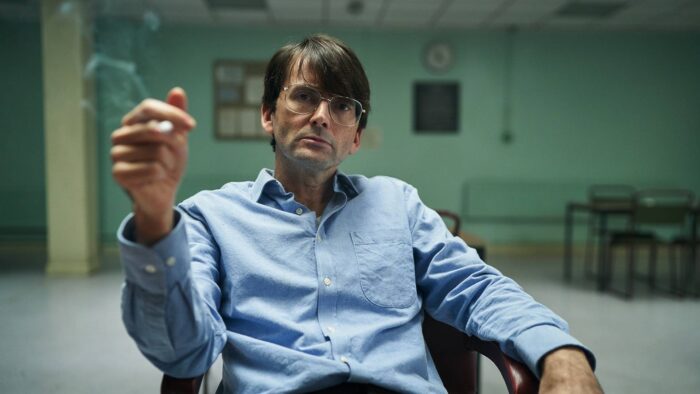Why you should catch up with ITV’s Des
Review Overview
Cast
8Script
8David Farnor | On 20, Sep 2020
“Why did you kill all those boys?” “I don’t really know. I was rather hoping you could tell me.” That’s the sound of Dennis Nilsen being arrested for the murder of boys and young men in the 1970s and 1980s. Known as the “kindly killer”, the civil servant made headlines not only for his high number of victims – 15 – but of how he then treated them kindly after he had killed them, chatting to them or dressing them up, before dismembering them and removing the pieces.
These remains are what led him to be arrested, after bones were discovered causing the blockage of the drain by his home. He welcomed the attention, inviting the police to investigate his wrongdoings and meeting one visitor while behind bars: writer Brian Masters, who would go on to be his biographer. Killing for Company was the name of the book that followed, although Dennis tellingly requested it be named after him. While ITV obliges, in a sense, by calling its three-part series “Des”, after his self-coined nickname, the true crime drama doesn’t celebrate the killer, but rather explores both the psychology of this unusual killer and, most of all, the impact his company and behaviour upon the people who fell into his orbit.
The first is DCI Peter Jay, played with a remarkable intensity and earnest determination by Daniel Mays. Jay is superb as the dogged detective, who wants to find closure and justice for all of the families of Des’ victims – even though Des can’t remember half the names of the boys he murdered, and there’s little to no way to track each one down and confirm them as victims.
The second is Brian, played with a timid but focused demeanour by the always-excellent Jason Watkins. Brian is keen to get the details of the case right, to avoid slurs and homophobia seeping into the accounts of Des’ actions.
But as both men are drawn into the media circus, the insidious influence of the man at its heart starts to seep into their lives. One finds himself obsessing over his motivations. The other finds himself lending him a tie for the first day of the trial. Each one is shaken by how far they’ve changed from their usual selves.
The programme follows a conventional formula – Episode 1, the case is opened, Episode 2, preparing the evidence, Episode 3, the trial – but it opens its scope wide enough to capture more than the investigation procedure. There’s much of that to build tension and convey the powerful human cost that Jay is hoping to pay off come Des’ day in court, but there’s also time to dwell on how Jay’s ambitions are held back by the political and financial tensions that dictate the police force from above – and how even what seems like justice can still fall short at the crucial hurdle.
Luke Neal’s script weaves all these issues tightly together, while director Lewis Arnold keeps the pace taut. But the pair’s biggest success is to give room for its cast to retell the true crime with gripping nuance. While Watkins and Mays have an ambiguity about them, David Tennant comes to dominate the screen with his unsettling turn. Building on his work in Deadwater Fell and Criminal, he’s horribly magnetic here, throwing away casual comments and questions with a matter-of-fact creepiness and a disturbing apparent desire to cooperate with everyone. And yet he’s also a generous presence, low-key and unassuming enough to allow Mays and Watkins to make an impact too, and watching the three interact makes for gripping telly.
Des is available on ITV Hub.


















